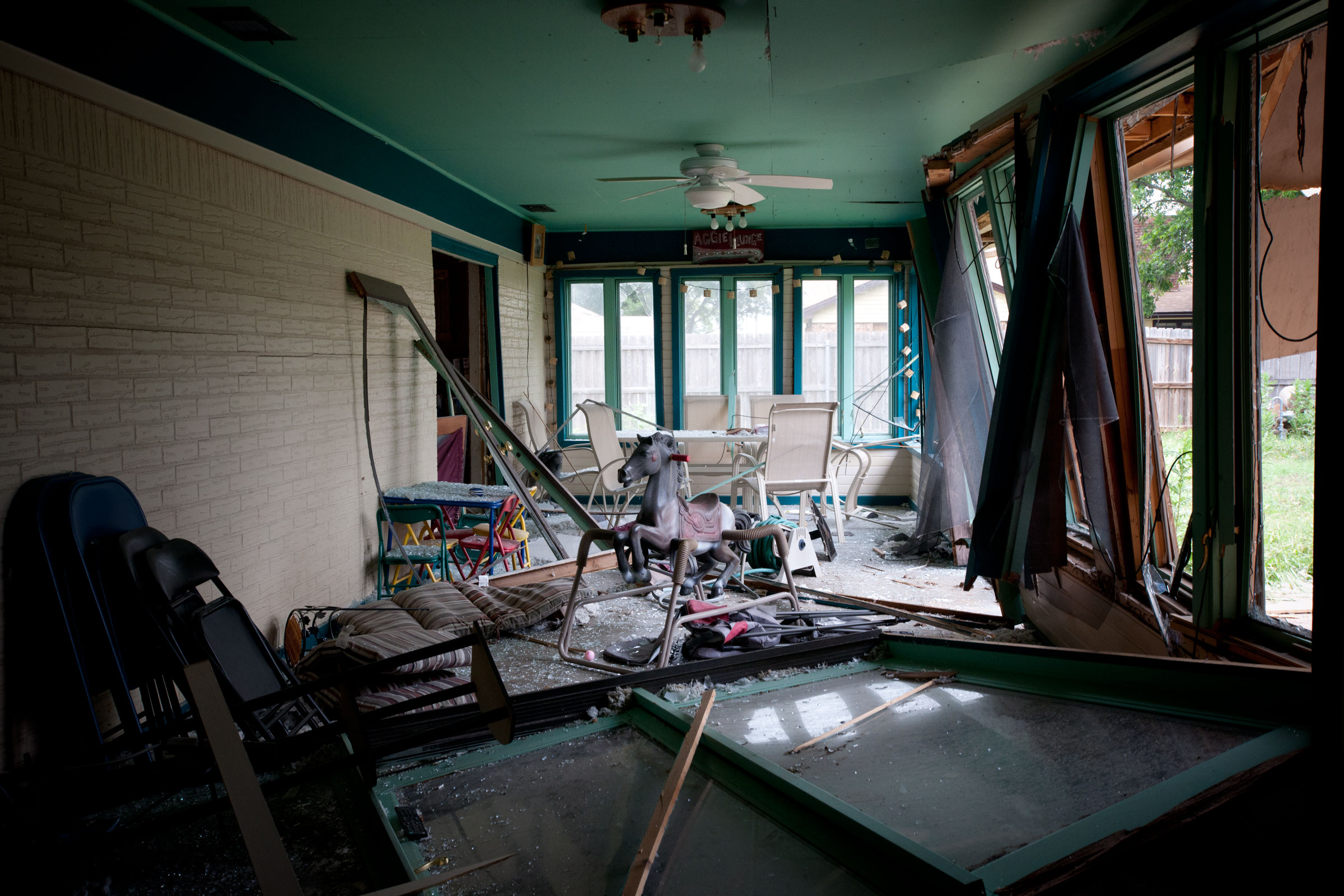If you were asked to draw a picture of a cowboy, you’d end up drawing Buck Uptmor.
Short and bandy-legged, with the permanently ruddy complexion of a man who spent much of his 45 years in a saddle, he looked exactly like a guy named Buck should look. It runs in the family. His younger brother, Brian, is short, too, but built like a fire hydrant. People call Brian “Peanut.” The Uptmors grew up in and around the tiny town of West, Texas, about an hour south of Dallas. Buck stayed in West and ran his own fencing and welding company. Brian left shortly after high school to fight fires.
For a month shy of 11 years, Brian was a firefighter-paramedic in Killeen, near Fort Hood. “Firefighter, it’s the greatest job in the world—if you’re single,” he says. He’d work 24 hours, then have 48 off. He’d finish his shift, go have breakfast with his crew, go to the gym, sleep, return to the gym, then get cleaned up and go out drinking with his fellow firefighters.
Then he got married, had a couple of daughters, and it wasn’t the best job to have anymore. His mother was going to sell a piece of his grandfather’s land in Tours, a tiny town that hugs the east side of West, so Brian bought it to keep it in the family, built a house in 2007, retired from the fire department, and moved his wife and daughters there. He took a job selling cars at a Ford dealership in West. But when there is a pasture fire, or maybe someone is hurt, Brian still gets calls. He has all his certifications, even if he doesn’t do it for a living anymore.
On Wednesday, April 17, about 7:30 in the evening, Brian got one of those calls. He was picking up his girls from St. Martin Parish in Tours. They were at their CCE class, the weekly catechism course most Catholic kids attend. His phone rang, but he figured he could call back whoever it was after he’d delivered his daughters safely home. The phone rang again, so he pulled into a parking lot to see who it was.
The first call had come from Ted Uptmore Jr. There are many people with that surname in West; some spell it with an “e,” and some don’t. Uptmore’s father is the general manager at West Fertilizer Co., where he has worked for five decades. Now Ted’s wife, Sherry, was on the phone: “Brian, fertilizer plant’s on fire! Ted wants you up here.”
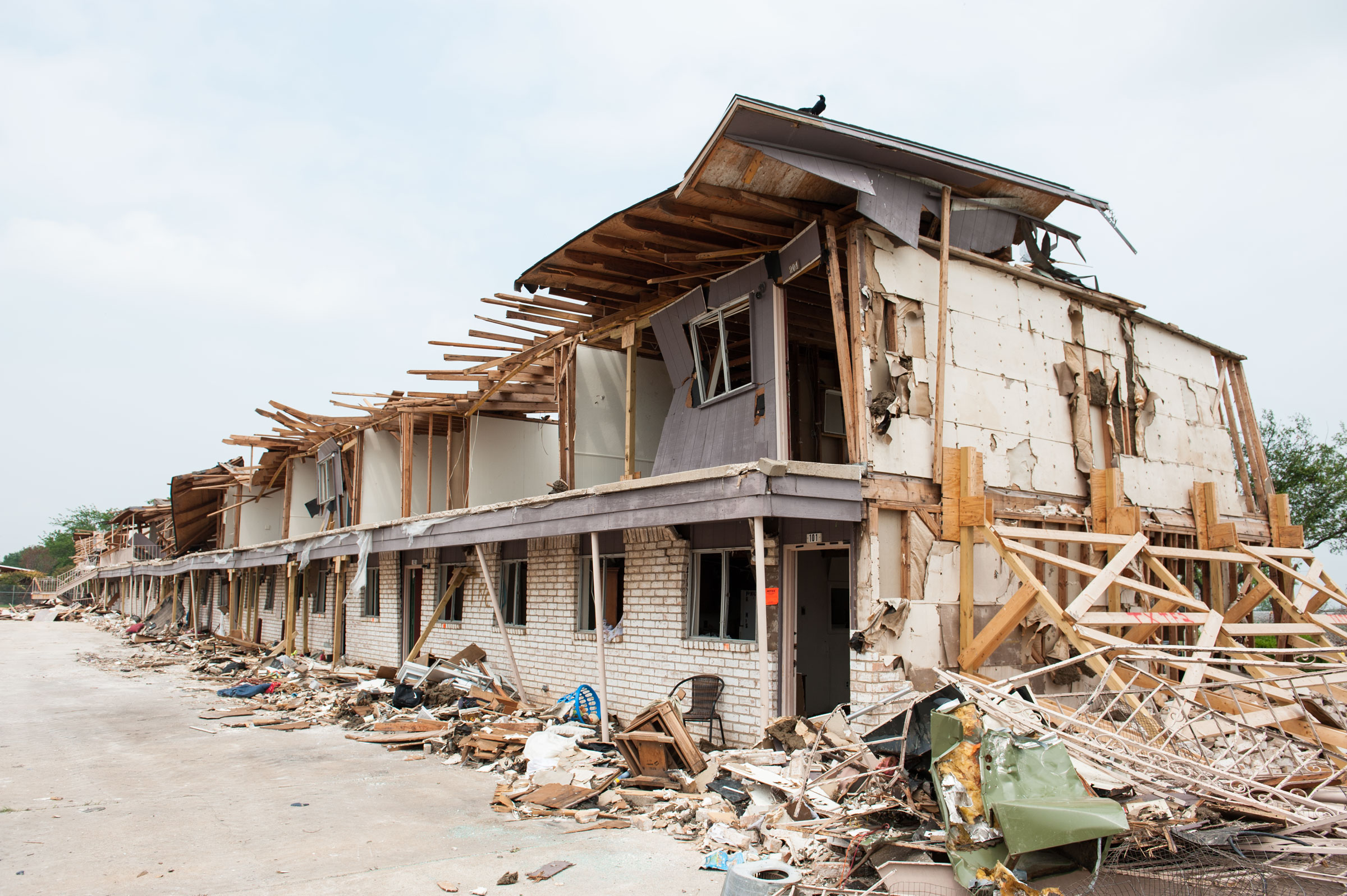
West Fertilizer Co. opened in 1962 on a sprawling site hard by the railroad tracks on what was then the northernmost edge of town. It only employed a dozen or so people, but in a farming community like West, it was an important business, if only for the sake of convenience. It saved the farmers from having to make a trip to Waco or Hillsboro.
The core of the facility was a 13,000-square-foot wooden building that stored solid fertilizer, such as ammonium nitrate, and two 12,000-gallon metal tanks that held anhydrous ammonia. A fleet of tanker trucks was generally parked outside, and a railroad spur led to the main tracks so that railcars could be loaded and unloaded. When it was built, the plant was surrounded by empty fields, some of which were used as pasture for horses and cattle.
Soon, though, the town migrated north, into the open countryside, growing up around West Fertilizer Co. In 1986, when West Texas Middle School opened its doors just across the railroad tracks, the plant was surrounded by development. West City Park, with its swing set and outdoor basketball court, sat only a few hundred feet away. On the other side of the park from the plant, there was a small apartment building. Behind that was the West Rest Haven nursing home. The rest of those old fields were filled in with ranch-style houses built where Reagan and Davis streets once ended. I grew up in one of those houses.
For most of the residents, West Fertilizer Co. had been there so long that it practically felt like part of the natural landscape. No one thought about what was coming in and out of there every day on the railroad tracks. People only noticed the smell occasionally, and if you lived there long enough—almost everyone did—the unmistakable scent of ammonia became a fact of life, too.
• • •
At 7:49 pm, 20 minutes after the initial call had gone out about a fire at West Fertilizer Co., the building began to collapse. Falling heavy debris detonated about 30 tons of ammonium nitrate, enough to fill a third of a railcar. The energy released was the equivalent of almost 20,000 pounds of dynamite.
The explosion was so powerful that the U.S. Geological Survey near Lake Whitney registered it as a 2.1-magnitude earthquake. It left a crater almost 100 feet wide and 10 feet deep, blowing through the plant’s three-foot-thick cement foundation. The mushroom cloud that resulted was visible from Arlington, 80 miles away.
The explosion spit fire and hot metal into the surrounding area, burning three homes to the ground and melting a large portion of nearby West Intermediate School. Debris from the plant was later found 2.5 miles away. The apartment building across the railroad tracks became a charred skeleton, open to the front and back, its contents shaken out on both sides.
Jagged shards of tin knifed through the air, hunks of thick pipe tumbled from the sky, and massive chunks of concrete crashed through walls and roofs. The majority of the houses in a five-block radius were rocked by forces acting in two directions. First, a shockwave of energy traveling in excess of 7,000 mph snapped wall studs and ceiling rafters and shattered glass windows and doors. Then a vacuum sucked everything back toward ground zero, yanking down sheetrock and insulation and caving in roofs.
The explosion killed 15 people, injured 200 others, destroyed 161 houses and damaged almost 175 more. It is something like a miracle that those numbers are so low. The fertilizer plant stored a total of 150 tons of ammonium nitrate: the wooden building housed about 50 tons, and another 100 or so sat in a nearby railcar. The explosion could have been five times more powerful than it was, if everything had ignited.
The railroad tracks almost certainly saved lives. They were built atop a six-foot embankment that deflected upward some of the explosion’s energy as it traveled from the plant toward the apartments and the nursing home and the neighborhood.
“If the railroad track wouldn’t have been there, everybody in the rest home—forget hurt. Dead,” Brian says. “Dead, dude. We’d still be having funerals, okay?”
Until April 17, West was known as more of a glorified rest stop than a town. It was simply Exit 353 off I-35, the place to stop on the way to Dallas or Austin to buy kolaches, the pastries that are the Czech people’s main contribution to world cuisine. They would get no farther than Czech Stop, the bakery/gas station/convenience store along the east side of the highway. Opened in 1983, Czech Stop is such a familiar destination for travelers that a rival gas station closer to the northbound exit briefly attempted to piggyback on its success by naming its upstart kolache concern That Czech Bakery, an attempt to fool the few people who had yet to take Exit 353.
The only other attraction in West is Westfest, the Czech heritage festival held at the rodeo grounds every year since 1975. It brings almost 20,000 visitors to town over Labor Day weekend. They come for arts and crafts booths, polka dancing, beer, and, yes, kolaches. Brittney Kolar is the reigning Miss Westfest.
That narrow biography began to expand during the days following the explosion, as volunteers and reporters and news show hosts, such as Matt Lauer and Anderson Cooper, rushed to the city. The world learned about West’s volunteer fire department and that a significant part of the town had been built, seemingly against all logic, around a fertilizer plant. They met some of the residents. The population hovers around 2,800, so you could meet just about all of them over a weekend, especially if you went to church on Sunday. They learned to pronounce consonant-heavy Czech surnames. They saw the stoic manner in which people from West kept moving forward, a singular combination of Czech tradition, Texan grit, and small-town ways.
My grandfather Ben Sulak (pronounced “SHOE-lock”) moved to West not long after he was born in 1910 and lived there for much of the next 75 years, until he died of a stroke on a Main Street sidewalk. West was then what it is now, a small farming community—built around the railroad tracks and mostly populated by Czech immigrants like my great-grandparents—that willfully resisted growth, turning down offers over the years from Walmart and outlet malls to build there. It is the kind of place where everyone knows nearly everyone else, and even if you don’t live next door, you’re still a neighbor. It is the kind of place where people keep mowing their lawns even after their houses have been destroyed.
My parents moved to West shortly before I was born in 1974. In 1978, they built a house on Reagan Street, within eyesight of the fertilizer plant. The neighborhood wasn’t finished then. It was a four-bedroom, two-and-a-half-bath place they got a deal on because in the corner of their lot stood a high-voltage electrical transmission tower. When I was growing up, my brother and sister and our friends used one of the tower’s legs as home plate in our front-yard baseball games.
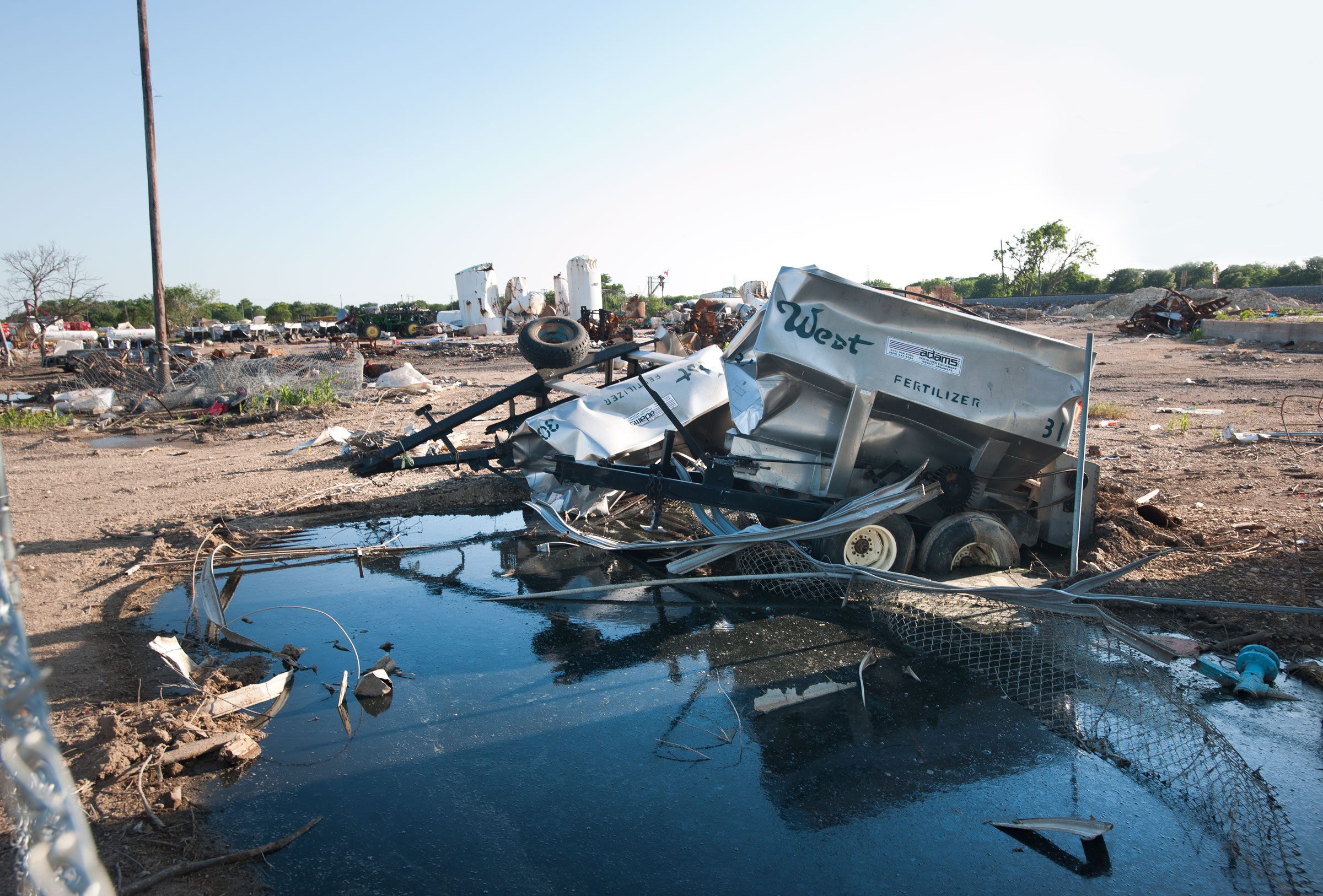
The fertilizer plant stood about 500 yards away, always looming in the distance. I could see that plant, and smell it, every day I was there. I played basketball in West City Park, across the railroad tracks from it. I was in the first sixth-grade class that attended the school down the road from the park, back when it was a middle school. I had a fight with a kid in the apartment building that was destroyed; we later made up and he showed me his uncle’s collection of throwing stars. My great-grandmother Ellen lived out her last days in the nursing home behind that apartment building.
For one reason or another—whether it was friends, or school candy sales, or simply to borrow something—I have been in almost every one of the houses in Zone 3, the area of West most severely damaged by the blast. I am a member of the RSP, the Reagan Street Posse, the name the kids who grew up there adopted. Yeah, we didn’t think very long about the name.
That neighborhood was my home. By the time you read this, it will all be gone.
Brian and I are sitting at Wolf’s Sports Bar on Oak Street, drinking schooners of Miller Lite and catching up. I do not call him Peanut. He was in my younger sister Samantha’s class all through school. I haven’t seen him since he moved back to town. After we quickly move through the past decade or so, I ask him about April 17. A month has passed since the explosion.
He was on the phone with someone when the plant exploded, he says, but he still can’t remember whom he was talking to. “That’s a blank,” Brian says. He can only remember how what he saw “went from just a smokestack to a by-god freakin’ mushroom cloud.” He didn’t feel a boom.
Brian pulled through the West High School parking lot off Jerry Mashek Drive, across the railroad tracks from Reagan Street. He drove onto the grass and parked; his was the third truck there.
“I jump out, and I had my stethoscope, BP cuff, stuff like that with me,” he says. “Just in my pockets and stuff, just in case.”
When he got out of his truck, he saw Emmanuel Mitchell and Eddie Hykel, both volunteer firefighters, and Chilo Rodriguez, who works with Brian’s brother, Buck. Their clothes had been blown off.
“Basically, what’s holding a shirt on, in front, on Chilo, is the band around the neck,” he says. “Just like someone got a pair of scissors and went zipt. Same thing with the pants. His waist was still on, but a whole leg was blown out the back. And he’s bleeding out the ears and the mouth and the nose. And Emmanuel’s the same.”
His paramedic training took over. “I’m just grabbing ’em, setting ’em on the tailgate, doing quick triage, just automatic—boom, boom, boom,” he says. “Emmanuel’s sitting there. If I could have taken a picture, that is the definition of a thousand-yard stare. He was just sitting there. He was not fixed on anything. Just staring out. Like, staring through everything, through space and time. He was like”—Brian switches to an affectless monotone—“ ‘I told ’em: we gotta go, boys. We gotta go.’ Looked like he had a wound on his leg. I didn’t know if it was shrapnel, if he fell, or what. His hand was swollen up.”
Eddie, the other volunteer firefighter, was hysterical, crying, repeating that he told those boys we need to go. Because of the shock and the adrenaline surge, Eddie didn’t realize he had a broken collarbone. And Chilo kept saying that Brian needed to call Buck, tell him that they needed to move the horses. Chilo tried to give him his keys and billfold, confused, patting pockets that weren’t there anymore.
“I’m like, ‘Chilo, hey, baby, don’t worry about it,’ ” he says. With help from some other men, Brian took Eddie and Chilo to the ambulances parked close to the high school. They found two other volunteer firefighters already there. One had been literally blown out of his boots.
When the ambulances left, he finally got around to calling his brother, Buck.
“I didn’t know Buck was there,” he says. “I had no idea. Chilo and Buck went over there, and I didn’t know anything about it. When he didn’t answer his phone Wednesday night, I knew. Nobody told us.”
When I was a senior in high school, I stepped on a belt buckle while hurriedly getting ready for school one morning. After my dad pulled the buckle’s prong out of my foot, he took me to the clinic that Dr. George Smith opened in 1975. Dr. Smith told me to stay off it for a while. We paid him $30 for that advice.
Dr. Smith has been in his new office less than a week. It’s in a space formerly occupied by JoAnn’s Bridal, on the other end of Davis Street, near downtown. The reception area looks like a normal doctor’s office, mostly because it’s furnished with what he was able to pull out of his old clinic, after it was destroyed in the explosion. It only seems like an odd location when you go through the door where the exam area is. At the back of the three cubicles where he sees patients is a trio of dressing rooms. In the room that houses his office and a setup for minor surgeries, the entire back wall is mirrored.
“It beats what we had, which was nothing,” he says.
The night of the explosion, Dr. Smith was at home, watching TV with his ambulance radio nearby. He runs West’s emergency medical services, in addition to serving as medical director for West Rest Haven, the nursing home up the street, and running his own clinic. He’s never completely off the clock.
Eddie, the other volunteer firefighter, was hysterical, crying, repeating that he told those boys we need to go. Because of the shokc and the adrenaline surge, Eddie didn’t realize he had a broken collarbone.
At 7:29 pm, an ambulance radioed in to dispatch, reporting it was on its way to a fire at West Fertilizer Co. Normally Dr. Smith takes care of the firefighters while they take care of the fire, but as he backed his truck into the street, he decided to head to the nursing home first, to move his patients. If the wind changed direction, it would send toxic chemicals their way.
His plan was to shelter in place—move everyone as far away as possible, turn off the air conditioning, put wet towels under the doors. He was still dealing with a fire. “If you take them outside the building and then the smoke changes,” he says, “you’ve put them into what you’re trying to avoid.” Smith and the nurses worked as fast as they could, but it was a slow process.
Then the plant exploded.
Dr. Smith pulls his iPhone out of the holster on his belt and scrolls through his photos until he finds the one he wants me to see. “That’s where I was at when the explosion happened,” he says. It’s taken from outside West Rest Haven. Asphalt shingles hang limp in tattered sections, almost touching the ground in places. It’s the only thing that signifies the pile of rubble was once a building.
“I was under that,” he says. He had sustained a gash across the bridge of his nose. “I don’t know how I got out of that alive. In just the blink of an eye—you can’t imagine the power of that explosion. You know how close it is. It’s less than 200 yards. In a blink of an eye, you get this tremendous concussion, you’re knocked on the ground, and then the roof is on top of you, and the ceiling and the lighting and everything else between the roof.”
Smith is the medical commander of Texas-1 Disaster Medical Assistance Team, which has taken him to Hurricanes Katrina and Isaac. Now disaster had come to him. He checked on his family first. His wife, Jean, was in his truck. She doesn’t normally go with him on calls, but she did that night. She had been doing some paperwork and wanted to take a break. Jean was shaken up, but okay. His son, Kevin, lives nearby, two doors down from West City Park, across from the plant.
“He just put a new roof on and paid a little extra money to get the fire-resistant roof, and I’m convinced that’s what saved his house from burning,” Dr. Smith says. The house next door did burn. “He had been in the living room watching television in front of the bay window. He’d gone upstairs to do some work when the explosion happened. Had he stayed downstairs, the bay window blew in where he was sitting. I’m sure it would have killed him.”
Once he had accounted for his family, Dr. Smith “immediately went from nursing home medical director mode to disaster mode.”
After moving some oxygen cylinders to the community center on the other end of town, where patients would be taken, he noticed the lights of the high school football field were lit, and saw they were triaging people. He stopped to ask where incident command was.
“The nurse who was triaging there took one look at me and said, ‘You’re no longer Dr. Smith. You’re George Smith, patient. Sit down, you’re bleeding,’ ” he says. “So I did—for about two seconds until she turned around, but I had too much work to do.
“For the first time in my life, I was absolutely overwhelmed,” he says.
Dr. Smith went to a helicopter, because he knew they had satellite radios. He called Sam Tessen, the executive director of the Texas Osteopathic Medical Association, in Austin. He told Tessen to use his political contacts to tell Emergency Management in Austin that there had been “a massive explosion, with hundreds of casualties. ” He was guessing at that point.
Frank Patterson, director of emergency management for McLennan County, had just arrived and was setting up. Patterson asked if he would stay with the Hill County justice of the peace and help identify bodies. Dr. Smith was sitting in his truck, waiting for them to be able to get to the bodies, because it was still an active fire. While he was waiting, that’s when he did what he calls “the bloody interviews.” Smith became the voice of the town, talking to CNN’s Piers Morgan and TV reporters from Dallas and Waco and wherever else, speaking as a resident, a doctor, a neighbor. His face—smeared with blood, eyes just this side of wild—was one of the most memorable images of that first night.
At 4:30 am, he went to Hill Regional Hospital—“because I knew Hillcrest and Providence were being slammed”—and got his cut sewn up. Then he went to his friend Ben Ranzinger’s house, south of town, where he’s been living since. But he wasn’t there long.
“I got to Ben’s house about 5:15, and had to leave at 5:30 for Good Morning America,” he says. “I didn’t sleep for 36 straight hours.”
Kim Woodard and her husband, David, were a couple of years ahead of me in high school. I remember Kim in black satin and rhinestones, twirling for the marching band, and David dusty in catcher’s gear, playing baseball for his father, Wayne.
On April 17, Kim’s mother, Cathy Kaska, called to tell her about the fire. They live about half a block away from each other on Reagan Street. Kim had just picked up her daughters, 9-year-old Dayla and 14-year-old Kearstyn, from their CCE class at St. Mary’s Catholic School across town.
Kim went outside to see what her mom was talking about. Two of her neighbors pulled up and told her that everyone was starting to spray water on their roofs so their homes wouldn’t catch fire. Just as she turned to get her hose, the fertilizer plant exploded. She was thrown to the ground. At least that is what she’s been told.
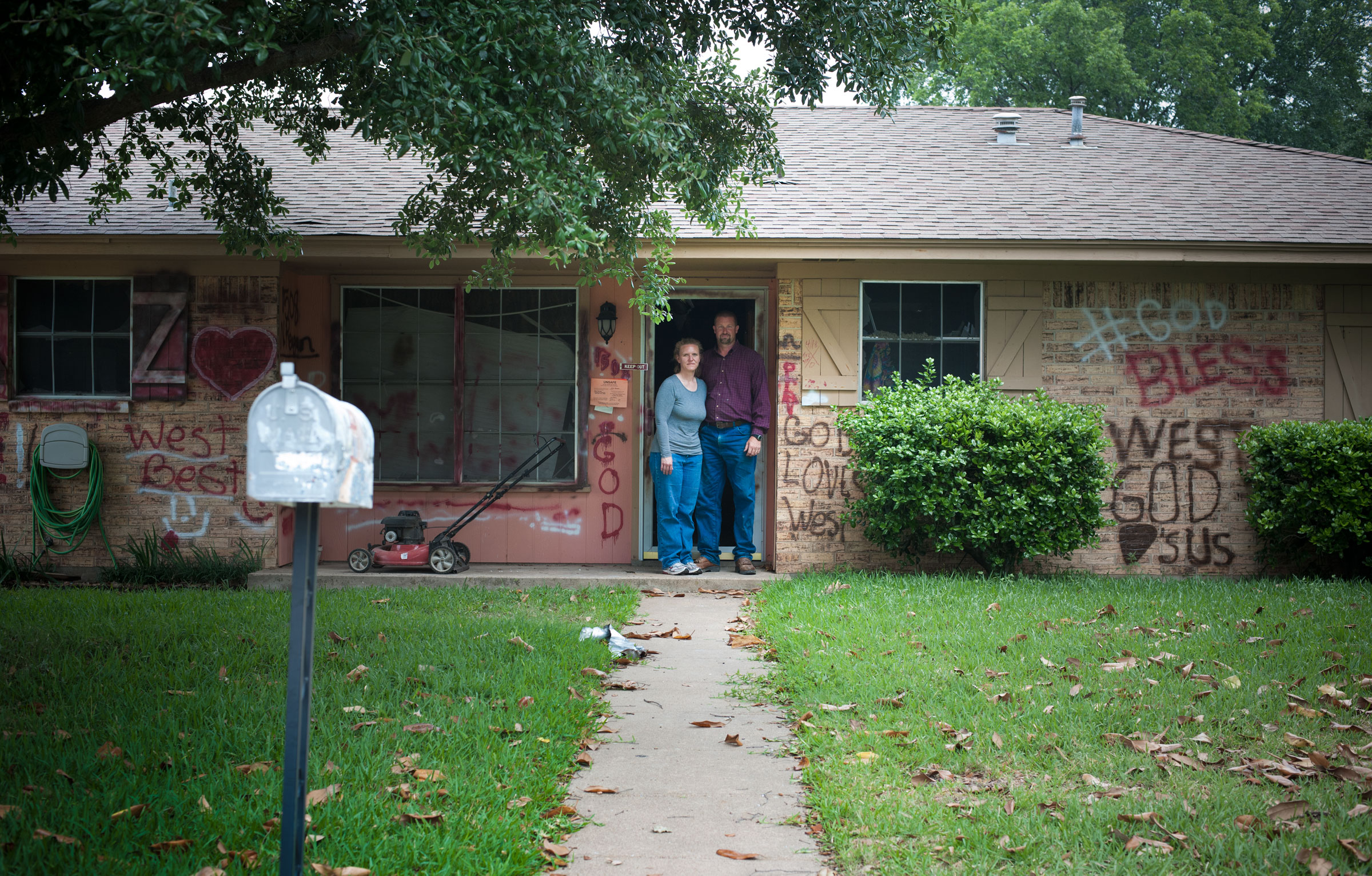
She doesn’t remember much of anything until she and her daughters ended up back in the front yard. Kearstyn’s bedroom and Dayla’s playroom are at the back of the house, closest to the blast. The ceiling collapsed on them. Kearstyn was fine; Dayla had scratches on her eyelid and behind her ear, but she was okay, too. They got out through a window. Kim and the girls were sitting in the front yard together, trying to figure out what to do, when a shirtless man in an El Camino pulled up.
“He told us we needed to evacuate because they were expecting a second explosion,” Kim says. “And we didn’t have a vehicle to evacuate, so we got in the car with a strange guy. In an El Camino.” She laughs at how crazy it must sound. “But some guy that we didn’t know, he took us to the community center.”
Her husband, David, the high school football coach and West ISD’s new athletic director, was coming home from a track meet in College Station. The kids always ask to go out for dinner after meets. David usually refuses, but this time he had relented. Had they come straight back to West, they more than likely would have been at the high school, a third of a mile from the fertilizer plant. Instead, David and the track team were 40 miles away when they heard what had happened back home.
Kim’s mom, Cathy, was sitting in a chair on her front porch when the fertilizer plant exploded. The blast blew her out of her chair and onto the porch, flat on her back. When Cathy opened her eyes, she saw debris everywhere, burning pieces of metal falling from the sky. She looked down at her chest. Lying on top of her—unbroken and seemingly untouched—was a three-foot statue of the Blessed Virgin Mary.
“So she, of course, said that was the first thing they got when they went back,” Kim says.
For no good reason, Jeff Holloman took me under his wing on a school band trip to Disney World. We both played the tuba. He was two years older than I, popular and funny. I was too shy to be either. Jeff was that kind of guy. He still is. He bought a redbrick house on Davis Street in 2006, but he has lived in West most of his life. He was the first baby born at the now closed West Texas Hospital.
Jeff lives across a street and an alley from the Woodards, about 2,000 feet from the fertilizer plant. He had just pulled into his driveway when he noticed the smoke. He backed out and—“I guess being the good redneck I am,” he says—headed in the direction of the fire. He made his way to West City Park, between the fertilizer plant and the small apartment building. But being so close to the fire made him uncomfortable, so Jeff drove back around the corner, stopping to visit with neighbors before returning home.
When the fertilizer plant exploded, his wife, Becky, was in the front yard, talking to their neighbors across the street. One of his triplet daughters, Ally, was inside on the couch, watching TV. Her sisters, Abby and Audrey, and younger brother Brett were with their grandmother, Carolyn, coming home from CCE class. Ally was home because she had a stomach bug. Her siblings and grandmother would have been home, too, but Carolyn wanted to ask the CCE director about buying Bibles for the class she taught. It delayed them 10 or 15 minutes—just long enough.
Jeff was in his driveway, behind his truck. He heard a sporadic popping. He thought the house next to the plant was on fire, too, that the sound was bullets catching fire. Or maybe firecrackers.
Less than a minute later, he saw a bright flash and heard a deep boom. “I thought I was imagining this, but others saw it, too: for a split second, I could see wavy, ripple-y air,” he says. “It was the shockwave. I could see it hover. I could see it come right above the treeline.” Then he was blown onto his back on the driveway. Out front, Becky was thrown into the grass. And inside, Abby was buried under collapsed drywall. A ceiling fan fell on her, too.
Jeff doesn’t know how long he was on the ground. When he was able finally to go back to the house days later, he saw what could have been. On the driveway, maybe a foot from where he had been standing, there was chalky residue from where a piece of concrete had landed, before smashing against the back of his house. In his mother Carolyn’s backyard there was a 16-foot length of auger pipe, a foot in diameter, thrust into the back wall, near the roofline. Judging from its path—where it clipped a tree, smashed through a fence, and landed hard enough to gouge a foot-deep gash in Carolyn’s lawn before cartwheeling into her house—it, too, had been headed straight for him.
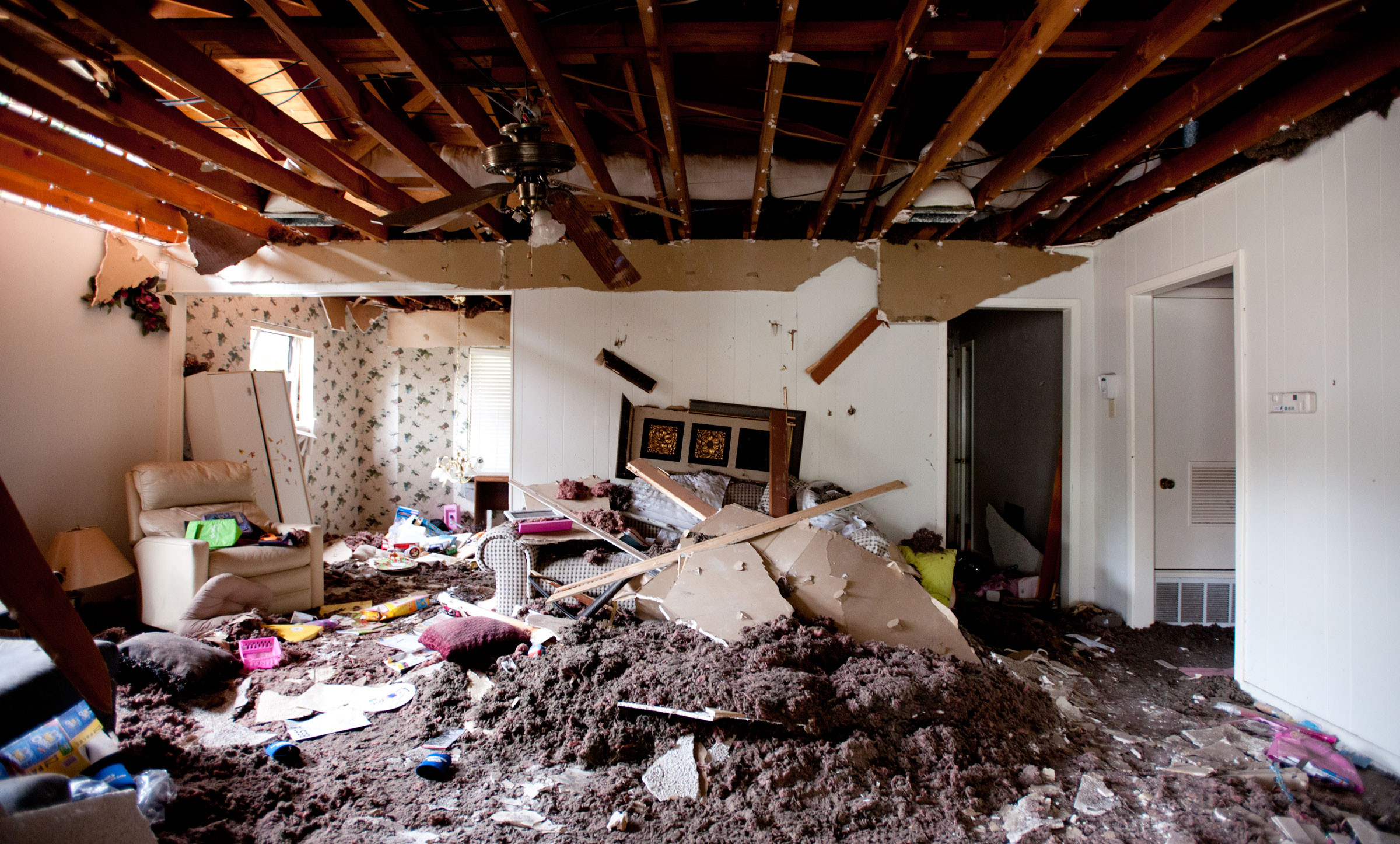
When he came to his senses and got up, it was pitch black inside and out. The electricity had been knocked out, and the sky was thick with dust, smoke, and ash. An eerie quiet was punctured by screaming: Becky, because Abby was inside; and Abby, because her parents weren’t. The back door was closest to her, but the carport had caved in. They ran to the front and Becky followed Abby’s voice. She pulled her daughter from under the pile of insulation and drywall, and Abby walked out barefoot over a carpet of broken glass. “And never cut herself,” Jeff says, shaking his head.
They huddled together under a tree in their front yard until they noticed debris was still falling, and some of it was on fire. They moved to the front porch to shield themselves. They could barely see across the street and realized they were having trouble breathing. Then Becky looked at her husband with a tortured look on her face.
“Some debris hit me,” Jeff says. “After she said something, I could feel a warm sensation on the back of my head. I kind of dragged my hand like this, and it was solid blood.”
They ran to his truck. Because of ongoing road construction, it was quicker to head northbound on I-35, so they went that way, as fast they could, for Hill Regional Hospital, in Hillsboro. “I always keep a rag in my console, because my kids are always spilling stuff in my truck,” Jeff says. “I’m not sure how it turns out, but I’ve got that rag on my head and I’m the one driving.” He laughs. “I probably shouldn’t have been.”
Jeff and his family were the first to arrive at the Hillsboro hospital, about 20 miles away. Jeff was frantic. He was trying to tell them about what had happened, that there were many more injured. “I don’t think they understood what I was trying to tell them,” he says. “Becky said that I was getting mad at them and yelling at them.” They finally took him to a room.
By the time a nurse came to check on him, someone else from West had arrived at the hospital. Steve Matus lives just around the corner from Jeff. Minutes before the explosion, Jeff had stopped to talk about the fire with Steve, who was standing in his front yard. They’d joked about the possibility of the plant exploding.
Now, Steve was in a wheelchair, his eyes swollen shut, and he had cuts all over. Jeff sat with Steve, trying to comfort him, waiting for someone to come tend to him.
He asked one passing nurse to come see about Steve, then another. Frustrated and scared, and still bleeding himself, Jeff walked down to the main nurses’ station. He saw an older man in a white coat. That was good enough.
“I don’t know if he’s in charge. But”—he laughs at himself again—“not the smartest thing to do, but I grab his arm and I physically drag him to that room. He’s telling me to let go, and I won’t. Finally he starts walking willingly with me. I show him Steve, and he’s got a startled look on his face, like ‘Oh, my God.’ Steve is bleeding so much that blood is pooling on the floor.
“Finally they get a team working on him,” he says. He pauses. “What I didn’t know—the people they did have there were tending to his wife and grandson. I didn’t know that. That’s why no one was coming in there.”
After Jeff had left Steve on his lawn, Steve had gone inside with his wife, Deirdre, and their 6-year-old grandson, Brayden. They watched the fire through their bay window. When the plant exploded, their faces were pelted with shards of glass from the window.
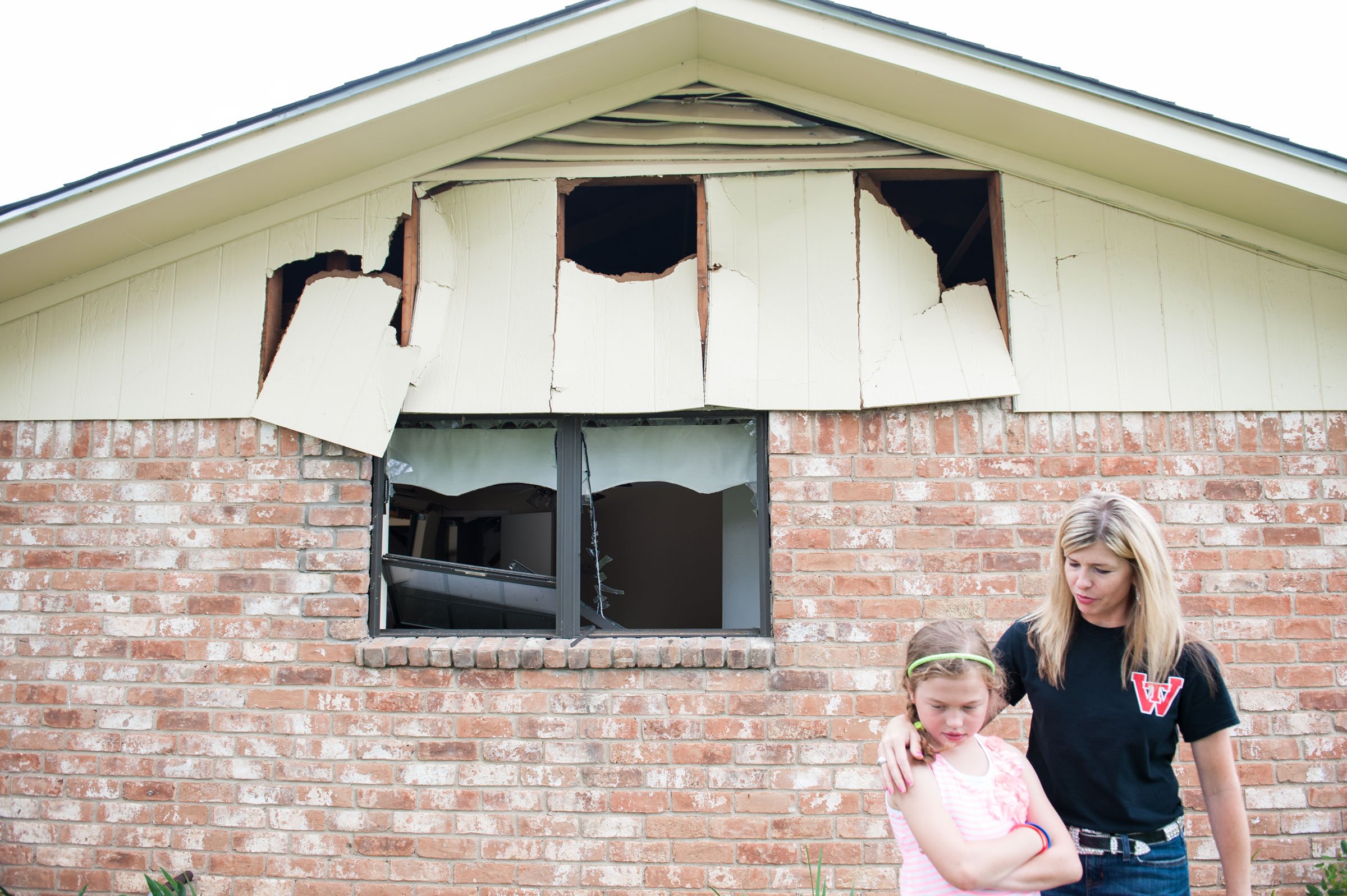
Because of his past as a firefighter-paramedic, Brian was able to access the fertilizer plant the morning after the explosion. He went to find his brother Buck’s body.
“A 2D picture does not do it justice,” he says. “You’re standing in a pile of shit. This plant has been here since we’ve been here, and it’s gone. I mean, the energy release—I’ve been to hurricanes, tornados, floods, you know, with the fire department. We sent a team to Katrina and down south to Houston. I’ve seen all that. That’s over a period of time. This shit happened within a matter of three seconds. By the time from when it exploded and it landed back to earth, it was probably three seconds, max. It did all this to this town.”
He shows me a photo on his phone of a chunk of metal he found a quarter-mile away. It’s thick and rusted all the way through. “That’s from pyrolysis,” he says. “That’s a huge release of energy at one time, why it rusted already.”
Brian still doesn’t know why Buck was near the plant. He has heard so many different stories about where he was, what he was doing. Most likely, Buck was moving horses in a pasture close to the plant. Brian doesn’t care what started the fire. He just wants to know what exactly happened to his brother. To get some form of closure, he begged Larry Payne at Aderhold Funeral Home to see his brother’s body.
“I was like, ‘Look, without Arcy’ ”—Buck’s wife—“ ‘or anybody else knowing, look, just let me see the body. That’s all I want to do. I know he’s dead. I know it’s horrible, it’s grotesque. I’ve seen it. I’ve seen people burned up. I’ve run calls. I’ve seen this shit. It’s my brother. I need to see this.’ I asked him 20 times.” Payne couldn’t let him do that. There was paperwork, and Arcy would have to get involved. “And I didn’t want her looking. She didn’t need that last image, but I did, and still do.”
Brian started a new job—doing outside sales for Vermeer, a heavy equipment company—at the beginning of May. Partly because it was a good job, and partly because his previous job—doing the same thing for Sykora Family Ford in West—forced him to confront too much sympathy.
“I didn’t feel like going into those businesses and reliving every single thing over again.” He hits his chair for emphasis on the last five words. “ ‘Oh, poor thing.’ I’m not a pity-party guy. I don’t do that crap. People will come up to me”—he tilts his head—“ ‘Sorry.’ And I appreciate all the gestures and all that stuff. But, okay—you grew up Catholic, right? Okay. They say the biggest sacrifice a person can make is giving his life for his friends, right? And it also says that people who are doing a valiant, unselfish act and die, go straight to heaven. You know? Our life is not that long here on earth. We’re gonna see him. He’s already there. I mean, think about it: when you die, you wanna go straight there? That’d be the way I’d wanna go.”
Brian hasn’t been contacted directly by any lawyers, and he’s not looking. And since the explosion, Buck’s wife, Arcy, has kept her gate closed and doesn’t answer calls from numbers she doesn’t recognize.
“Suing somebody’s not gonna bring ’em back,” Brian says. “It’s done.”
“Ol’ Piggy Clark said one guy had a full-page ad about a town meeting,” Jerome Lednicky says. I’m in his office, with his wife, Lucille. Jerome has been the president of State National Bank for decades. “So he went up there, and he says the lawyer was up there, and the other six or seven people were from out of town.” He means people who have lived in West for only a few years. “And a lawyer was asking them, you know, if any of them had any medical problems. And this one lady said, ‘Well, yeah, about three years ago, I had to go see a psychiatrist’ ”—he and Lucille both start laughing—“ ‘and I think I might have to go again.’ But, you know, they weren’t even from here. So the people that are suing so far are either insurance companies or out-of-town people.”
There have only been a handful of lawsuits filed in the wake of the explosion. And Jerome is right—they are all the work of insurance companies or “out-of-town people.” Whether it’s the right or wrong course of action doesn’t matter. It’s not the way things are done in West. Like Lucille says, “People around here take care of themselves.” That means you don’t sue your neighbors.
Everyone in town knows Wanda and Don Adair, who bought West Fertilizer Co. in 2004 when it was on the verge of closing. Don is a farmer, and Wanda used to be a substitute teacher and writes a column for the West News. Everyone in town knows the plant manager, Ted Uptmore Sr., too. The plant was only insured for $1 million, but that number is almost irrelevant. No one blames them for what happened. They don’t care that the plant had a decades-long history of compliance problems with various governmental oversight organizations.
It was an accident. And no one knows exactly what caused it. Investigators from the federal Bureau of Alcohol, Tobacco, Firearms and Explosives and the Texas State Fire Marshal’s Office have narrowed it down to a few things: an old golf cart parked in the seed building, shoddy wiring in the building itself, maybe even arson. It’s unlikely they will narrow it down further, given that all the potential evidence is scattered as far away as 2.5 miles, and the people on the scene are either dead or don’t remember anything after arriving at the plant. But even if they do, unless it points to Don Adair holding a gas can and matches, it won’t matter.
None of the homeowners in Zone 3 are suing, except for Bridgett and Roger Bowles, who live two doors down from the Woodards. They filed their suit nine days after the explosion, asking for $1 million in damages. No one knows them well. Most of the people in the neighborhood weren’t even sure what their last name was. They think they moved in from the Connally area four or five years ago.
They are out-of-town people.
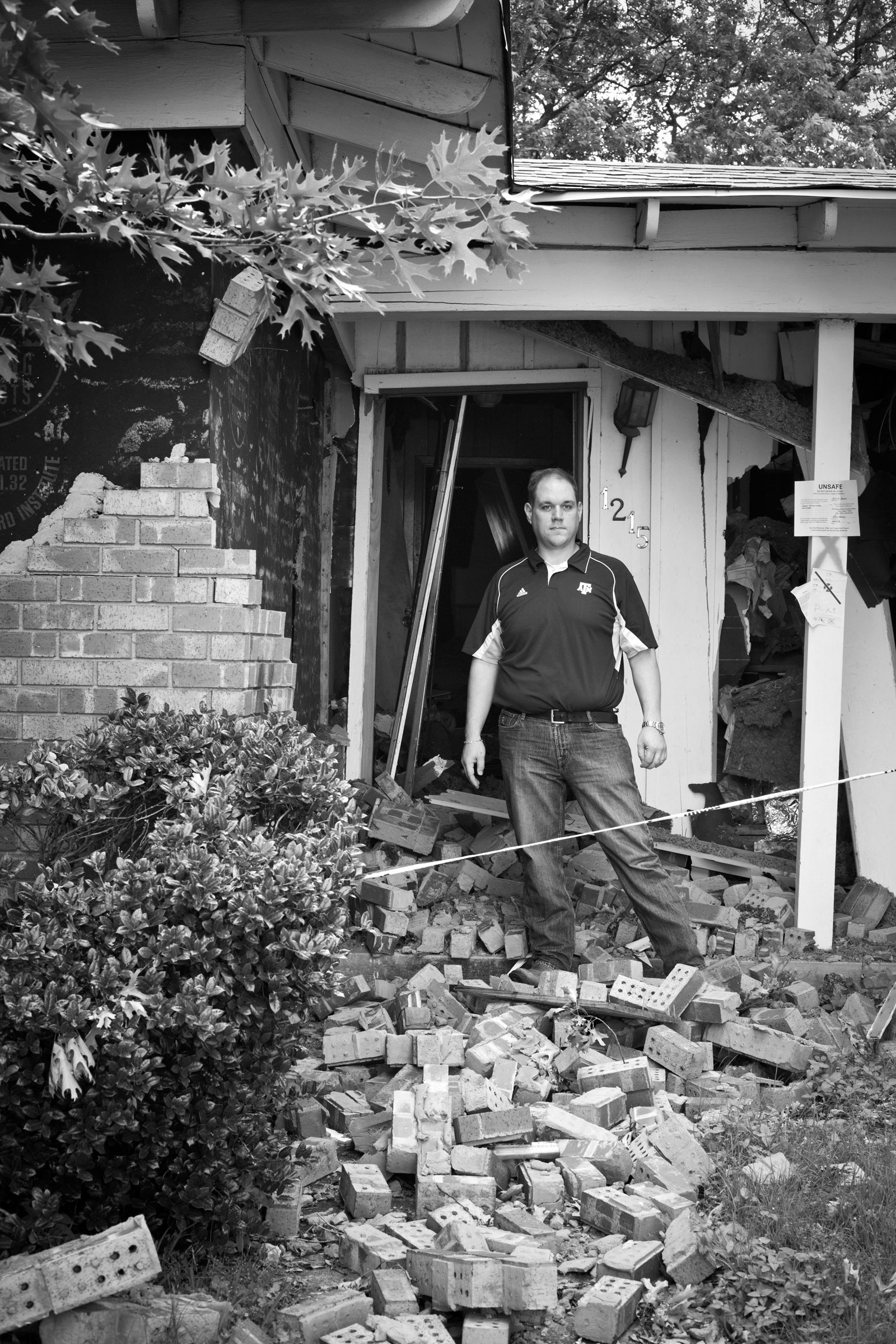
What I remember about Lucille and Jerome Lednicky’s home is the smell of Jerome’s pipe tobacco. I grew up with Mike, their youngest child and only son. We played in the open fields around the fertilizer plant, before houses started going in. Jerome and Lucille built their home on Reagan Street in 1964, when the only thing to the east of them was the plant.
On April 17, Jerome went into his backyard to see where the smoke was coming from. When he realized it was the fertilizer plant, he told Lucille they needed to get out of there. She grabbed her purse—because she was driving—and they took off in her Ford Expedition, leaving everything else behind. They drove south past a gathering crowd.
“There were so many people by the apartments, and cars,” Lucille says, “cars just stopped and looking.”
It’s May 11 now, and Mike and I are in his parents’ backyard with them. Jerome’s shed is there, mostly still intact. His kids and grandkids have spray-painted NA ZDRAVI on the side. It’s a Czech saying that means “to your health.” They did it the first weekend everyone in Zone 3 was allowed back. Most of the homes on Reagan and Davis have something painted on them. Some just say KEEP OUT. Others say GOD BLESS WEST, 4-17-13. The Malers’ house says RSP FOREVER on one side, and DÊKUJI WFD-EMT on the other. “Dêkuji” means “thank you” in Czech.
“That Saturday, we first got back in the neighborhood, and Daddy found his beer,” Mike says. “We iced it down with some ice the Red Cross gave us. We were drinking in his backyard just like normal, and come to find out a lot of people did that. Like Ricky Wolf lives down there, Coach Wolf—Pat Wright said they were doing that that Saturday when they got done moving stuff out. They were sitting in Rick’s backyard, drinking beer. It felt normal.”
Mike and his sisters, Karen and Kathleen, are here, too, helping get a few more things out of the house before it gets torn down. Mike and his wife, Jill, moved back to West five years ago. They were in Houston at the time, and had talked about moving to West when their three kids were a little older. Then Jill, a doctor, got a job at Providence Hospital in Waco, so they left. Mike bounced around for a few years. He took a job near Fort Worth (“It sucked”), then a job in Waco (“It kind of sucked”), and finally found a gig he likes at the new power plant in Riesel, where he’s the accounting manager. “I’m probably taking half the pay I was in Houston,” he says. Being back in West makes up for some of it. They live outside of town, on 50 acres of family land.
We move around front. Jerome looks at what’s left. “That roof is sagging more all the time,” he says. Jerome used to sit on his front porch and watch the high school boys play baseball at the diamond across the street. He remembers one of the Sykora boys knocking out a window with a home run. They sent Steve Kucera over to retrieve the ball and apologize. “I said, ‘Here’s a dollar. Tell him to hit another one.’ ”
A steady stream of cars and trucks slowly drives by on Reagan Street. Some of them are here to help. People walk alongside with bottles of water for the residents who are working to clear out their homes. Another group comes by later with sausage sandwiches and chips bundled in plastic shopping bags. But many of them are here just to gawk. The ones who drive by are tolerable. It’s the ones that stop. Mike had to chase off one woman who got out of her car and was walking up to his parents’ home, filming with an iPad.
Charles Hutyra pulls over and walks up. Mike calls out, “Chuck Roast!”
“What’s going on?” Charles asks. He has run for West sheriff for years, thus far with no success.
“Aw, we’re just reminiscing,” Mike tells him.
They talk about where people were and what happened, who got beat up a little bit.
“Well, Mrs. Rauschuber was in her damn front yard and didn’t get hurt,” Mike says. “She got blown back. She’s 85. They said people who were outside fared better than, you know, inside they got—like ol’ Steve Matus—”
“How’s he doing on his eyes and everything?” Charles says.
“Jill saw him that night—they were triaging—and he said his eyeball was busted open, basically. So they think he lost sight in—Karen, did you hear how Fool was doing?” That’s what everyone who knows Steve Matus has called him for years. “Can any of them see?”
“Yeah, he can,” his sister, Karen, says.
“What about his wife?” Mike asks.
“His wife is blind, and the grandson can see.”
“Is she gonna be blind for sure?” Charles asks.
“That’s what they said.” (We later learned Steve has partial sight in one eye, and is blind in the other. Brayden has partial sight in both eyes.)
Everyone is quiet for a while. Charles leaves, and Mike and I walk down Reagan Street, past the nursing home and the apartments, wandering toward my old house. This is the first chance I’ve had to come down here since the explosion. The last time I was here was in September, for my 20-year high school reunion. My parents moved to Waco eight years ago, so I took the increasingly rare opportunity to drive around my neighborhood. I lingered by the park, drove slowly up and down Reagan and Davis, remembering.
Like Brian says, no photograph does justice to what it looks like now. The facades have the jagged smiles of jack-o’-lanterns, their bricks and boards covered in dirt and ash, even after recent storms. Some are burned, others caved in, each exterior damaged in similar and unique ways. A few look salvageable from the front, but it’s deceiving. A peek in the window reveals piles of drywall and insulation studded with the accumulated belongings of decades spent in the same home. And there is glass everywhere, scattered in yards and driveways, driven by the force of the blast into walls and door jambs.
Mike and I walk down to the end of Reagan Street, to my old house. It looks better than most from the front, but it has been marked for demolition like all the others. Upon closer inspection, it’s easy to see why. The roof is warped and buckling, the sure sign of broken support beams.
We turn and head back, walking through the alley that separates the homes on Reagan and Stillmeadow. We pass where Brian Kaska lives with his wife. Their home burned down that night. They’ve been going through the ashes and rubble with a box sifter. They were able to find his class ring from Texas A&M, and that’s about it. We finally end up at the park, close to the fertilizer plant, or what little remains. Two flags—of Texas and the United States—fly above the rubble. Mike gets quieter as we get closer. We walk past the apartments again.
“One of the firemen, C.J. Gillaspie, his son is on our T-ball team,” Mike says. “He was there with Joey Pustejovsky.” Pustejovsky, West’s city secretary and a member of the volunteer fire department, was one of the first responders killed in the explosion. He grew up in one of the houses we just passed. “C.J. went to change the hoses, him and Marty Marak. That’s the only reason they’re alive. I seen him that Friday. I said, ‘C.J., I was thinking about you.’ He said, ‘Well, I shouldn’t be here, Mike.’ And I said, ‘Yeah, you should. You are here. There’s a reason.’ ”
• • •
Joey Kolar was just a kid when I moved away from West. He lived two doors down from me. I remember him tagging along with his brother, Ray, and Kyle Hobbs, my next-door neighbor and de facto little brother. Kyle died in a car accident in 1996. That was the kind of tragedy West was used to dealing with.
We’re at Joey’s parents’ house. He wanted to show me the damage it sustained, but mostly we just trade stories about growing up here—in West, generally, and on Reagan Street, specifically. That’s how it has been with almost everyone I’ve visited in West. Sadness doesn’t last long. They dwell on good times here, not bad ones.
“A lot of the things that I did or accomplished, I attribute to everybody that we grew up with around here,” Joey says, “because you had so many older people that could show us younger bucks what to do, how to do it. That’s something I try to tell people. To have a childhood growing up like what we did here. It was awesome, because you would have, at any given time, 15 kids around the same age, within three or four years of each other, out there playing football, doing whatever they could. Football, baseball, basketball, putting a purse out in the middle of the road and reeling it in, redirecting traffic with cones.”
Not long after the explosion, Joey began planning a Reagan Street Posse reunion at the Knights of Columbus Hall, trying to get everyone back together. Many of them are still there, because West is a place where people come home to. Many of the people I grew up with are here. Some never left. Some came back after moving to bigger cities. I wouldn’t be surprised if I end up back in West one day. No one would. I’ve lived in Austin and Dallas, at more addresses than I can keep track of. But there is only one place that is home. I didn’t realize that until April 17, but I do now. Joey Kolar is right.
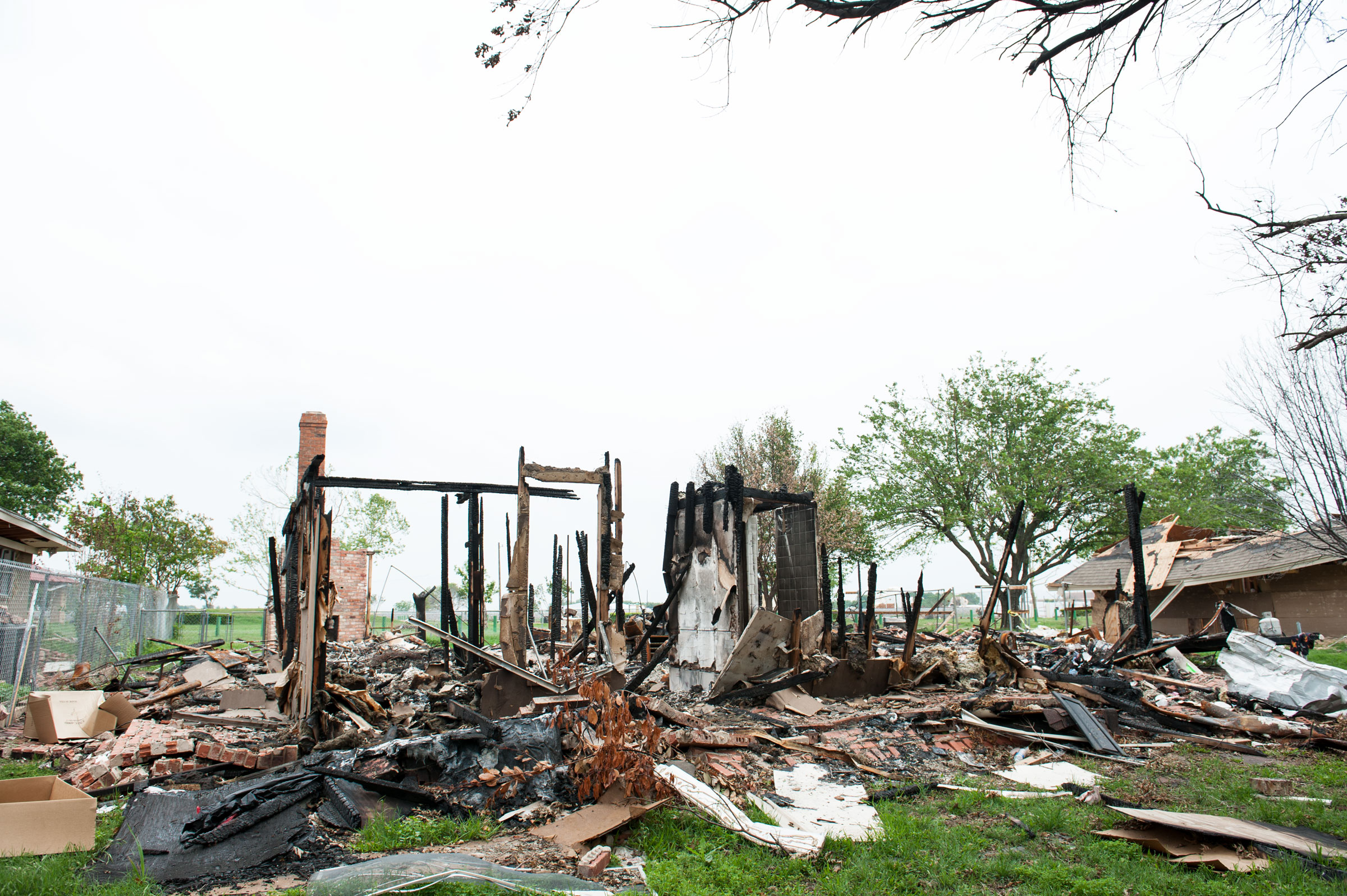
The explosion destroyed houses and businesses, but it didn’t break West. West is built like a sedimentary rock formation, each new generation adding another layer. If anything, the disaster and its aftermath strengthened it, as the townspeople rallied around each other, looking inward for help and support, relying on the friends and neighbors they’ve known for decades. In the wee hours of the morning after the explosion, WFAA Channel 8 broadcast from an empty gym in Abbott. It had been set up to accommodate victims, but everyone in West had friends and family to take them in. No one showed up.
People in West move ahead in the stoic manner I recognize in my mother, and I now see in myself and my brother and sister. There have been fundraisers all over the state. Travelers have stopped at Czech Stop and donated more than $100,000 as they leave with their kolaches. But the people in West already have what they need. They have it in their front yards and after church and at Wolf’s Sports Bar on Friday nights and the Knights of Columbus Hall on Sunday afternoons.
The fertilizer plant is gone, but they’ll have each other forever.
Brian and Buck Uptmor constantly gave each other hell, the way brothers do. If one of them was frustrated with the other, he’d say, “You better quit talking like that. You won’t have anybody at your funeral.” The other would say, “Hell, I bet my funeral is bigger than yours.”
“So, that asshole won that deal, I think,” Brian says. He laughs and takes a long pull from his schooner of Miller Lite.
Since the neighborhoods around the fertilizer plant were reopened, when he’s not working, Brian has been using equipment from his new job to help people clear out their homes. He did his grieving, in private, after the funeral. He’s done. Now he’s back to doing what he knows best. He’s fighting a fire. This one is going to take a long time to beat.
“I mean, my brother’s dead. You know? Ain’t nothing you can do about that,” he says. “What we can do is help the people who need some help. People ask me, ‘What can I do? What can I do?’ Man, hey, we had a great funeral. Everything’s awesome. My family is taken care of. We have a house to live in. They all have clothes. There is hundreds of people that don’t have a place to live. Don’t ask me. I’m good. Let’s help them, okay?”
Get the D Brief Newsletter
Author



